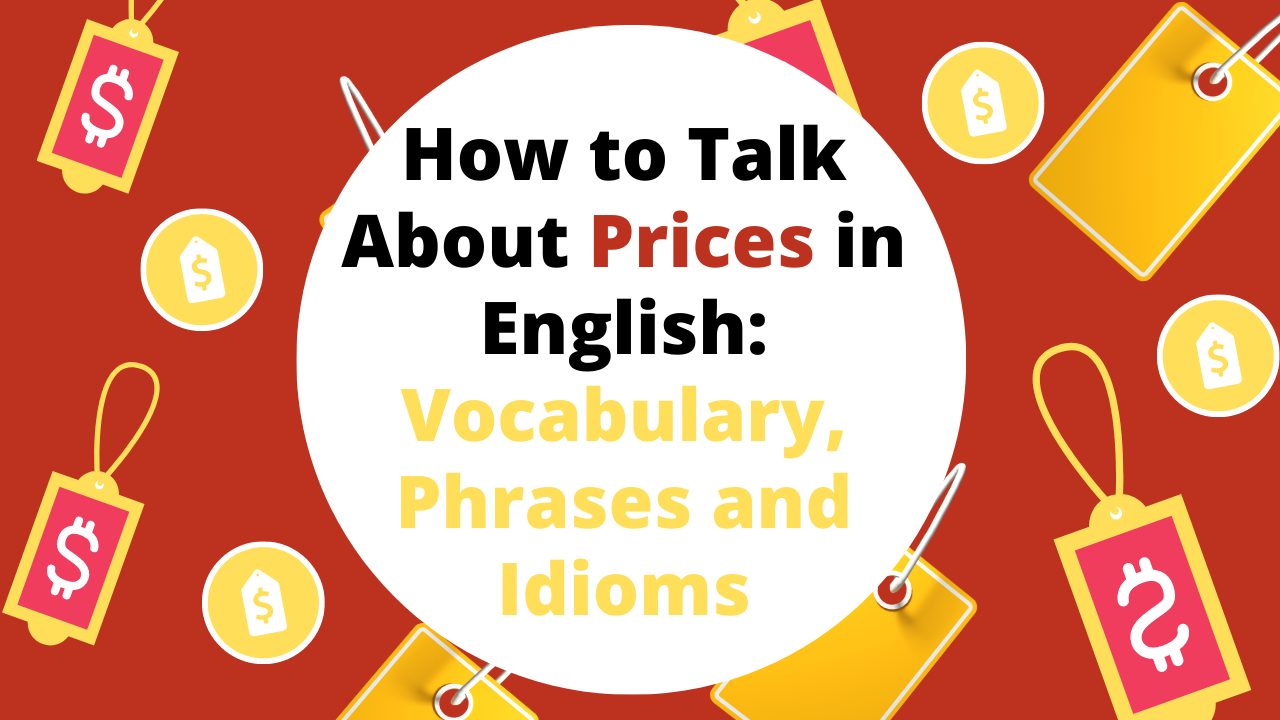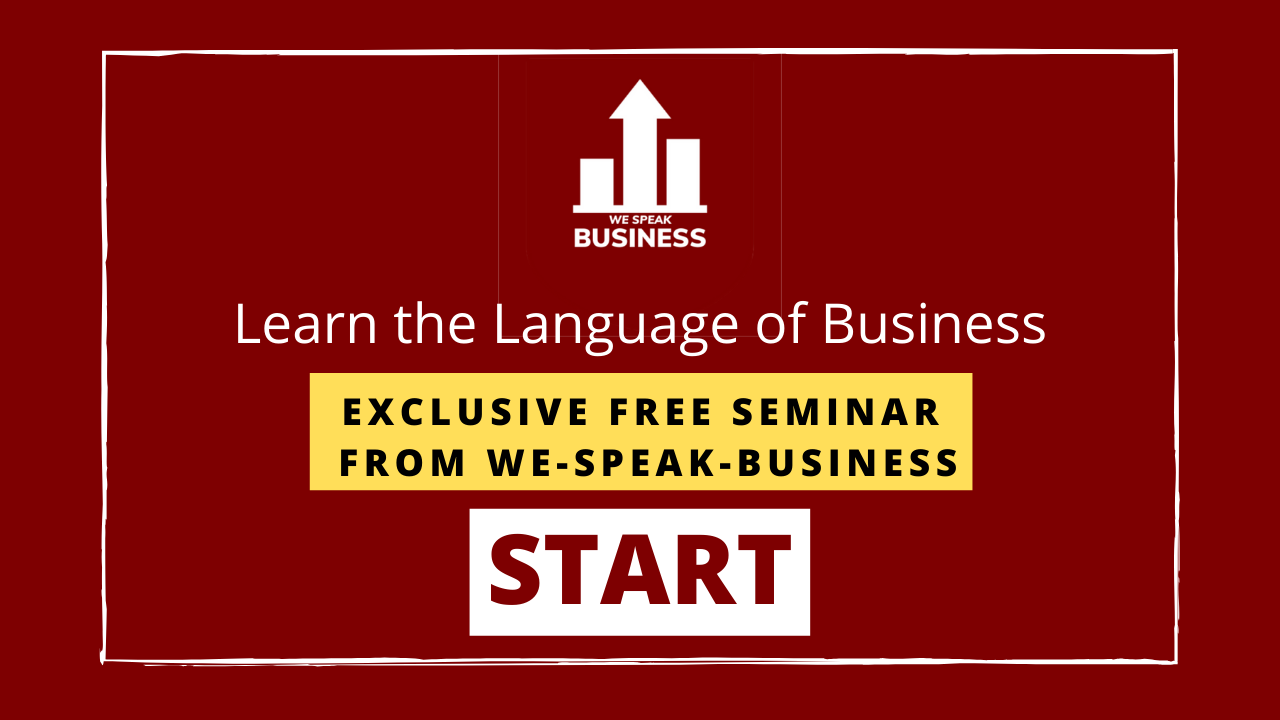How to Talk About Prices in English - Vocabulary, Phrases and Idioms
Jul 08, 2021
What Do We Mean By ‘prices’?
A price is the amount of money expected, required, or given in payment for something. Every product or service in the world has a price, and that price will depend on many different factors.
The main aim of this blog article is to build your business vocabulary on prices, but also on finances in general. As we say in English, money makes the world go around, so you will definitely need to know these words and phrases when talking about prices and finances at work in English.
Some of these words and phrases may already be familiar to you, whereas others will of course be new. Finally, make sure you don’t dismiss the ones you already know, you may have missed something!
Let’s start by clearly defining the main differences between a phrase and an idiom.
What’s The Difference Between a Phrase and An Idiom?
A phrase is essentially a group of words that express a concept and is used as a unit within a sentence. Eight common types of phrases are: noun, verb, gerund, infinitive, appositive, participial, prepositional, and absolute.
Some Examples of a Phrase Are:
“Sunday became a warm, sunny afternoon.”
“She was waiting for the rain to stop.”
An idiom on the other hand is a group of words established by usage as having a meaning not deducible from those of the individual words.

Two Common Examples of Idioms Are:
“Speaking English at work is a piece of cake!”
“Have you seen the weather outside? It’s raining cats and dogs!”
Useful Phrases
First of all, we’re going to look at some useful phrases we can use when talking about prices and sales in general. Remember to practice using them in example sentences of your own, and think about how you can apply these vocabularies to your own everyday work life.
Cost a Fortune
If something costs a fortune, then it means it costs a lot of money. You can refer to a large sum of money as a fortune or a small fortune to emphasize how large it is. Cost is simply the verb in this phrase.
“Their services cost a fortune. We’re going to have to speak to our line manager before we finalize the purchase.”
“That company car must have cost a small fortune.”
That’s a Bit Pricey/Steep!
When we think a product or service is a bit too expensive or overpriced, we can say that it’s ‘a bit pricey’ or ‘a bit steep’. We usually use this phrase in response to an offer that we think is too high.
“He showed me their new line of products but I thought they were a bit pricey to be honest.”
“$2000? Personally I think that’s a bit steep! Your competitors are offering the same product for a fraction of the price.”
It Costs an Arm and a Leg
Another great phrase we can use to talk about prices is “it costs an arm and a leg”, which essentially means something is very very expensive. It’s an idiom that compares the price and value of an item to our most important body parts - our arms and legs.
“I’d love to work with this new supplier, but their prices cost an arm and a leg.”
“Nowadays, it costs an arm and a leg to travel to London by train.”
That’s a Rip-Off! / I Was Ripped Off!
Have you ever paid a large sum of money for a product or service you thought wasn’t very good? Then I’m afraid you were “ripped off” my friend! As you may have already guessed, if something is a rip-off it means that the price is not worth the product, or that you’ve been cheated into buying something less valuable than you originally thought.
“That new smartphone is an absolute rip-off. I can’t believe I spent all of that money on it!”
“I felt we’ve really been ripped off here. Let’s contact our suppliers and see how they view it.”
I Can’t Afford It
If you can’t afford something, then it means you literally don’t have enough money to buy or pay for that thing. Afford is a verb which means the act of having enough money. We can either afford something or not afford something.
If you say that you cannot afford to do something or allow it to happen, you mean that you must not do it or must prevent it from happening because it would be harmful or embarrassing to you
“We really can’t afford to lose more of our sales team. It’ll look really bad on us.”
“Although we love your products, we simply just can’t afford them I’m afraid.”
That’s Quite Reasonable…
This is a great phrase. If a price is quite reasonable, it means that it is neither too expensive nor too cheap. If something is reasonable that the customer basically thinks the product or service is fairly priced. We can use the word ‘reasonable’ with many different adverbs.
“I think $150 for a new replacement part is quite reasonable in my opinion.”
“$10 for a t-shirt is very reasonable to me considering the production costs to make it.”

What is We Speak Business Program
We Speak Business is an English course with live speaking lessons for English learners who want speaking practice with native speakers, professional teachers, and students from around the world.
You have live speaking lessons where you can join and start speaking business English every day. There's a lesson every day and also, you can review all record lessons. There is a lot of conversation practice for each level of English (A2, B1-B2, C1). There is a calendar of scheduled lessons so you can see when lessons are and at what time you can join and start speaking.
 In We Speak Business program, you have 24/7 support and also you have student chat where you can speak with other students from all around the world. Before you join our program and start speaking business English, we strongly recommend you sign up for our free seminar with Andrew Smith, where you can learn:
In We Speak Business program, you have 24/7 support and also you have student chat where you can speak with other students from all around the world. Before you join our program and start speaking business English, we strongly recommend you sign up for our free seminar with Andrew Smith, where you can learn:
- What goals you need to have to get better results
- How to master business English quickly
- What are the strategies that will help you advance to a higher level
- How you can speak business English more fluently and confidently
- Free resources to help you learn business English
- Exclusive resource to improve your speech
Words About Prices
Now let’s take a look at some useful words relating to prices. You can use these words to talk about a variety of things, from prices to finances to the economy.
Debt (noun)
The word debt is a noun which means a sum of money that is owed or due to someone. We can also use the word debt as a feeling of gratitude for a service or favour. We can also use the phrase “to be in debt”.
“James is in a lot of debt at the moment after investing all of his money into that new stock.”
“Hidden debt is one of the most common reasons for couples separating or divorcing.”
Haggle (verb)
Haggling, or to haggle, is a verb, which means to dispute or bargain over the cost of something. You may have seen people haggling at market stalls when buying food or other products. It’s when the customer is trying to get the vendor to lower the price of something.
“My mum was great at haggling. She always got the best price.”
“If you can haggle then you can potentially save a lot of money.”
Thrifty (adjective)
Thrifty is a great adjective used to describe someone who uses and spends money or resources carefully.
“He had been brought up to be thrifty and careful with his money.”
“It’s no wonder Chris is the best purchaser we’ve ever had. He’s incredibly thrifty!”
Profit/Loss (noun)
A profit is a financial gain, especially the difference between the amount earned and the amount spent in buying, operating, or producing something. A loss on the other hand is an amount of money lost by a business or organization. Both words are nouns.
We can also use both of these words as collocations. We can ‘make profit’, or ‘make a loss.’
“We’ve made a lot of profit from this new advertising campaign.”
“We made a loss in Q3 so let’s hope Q4 will be better.”
Recession (noun)
A recession is basically when the economy is not doing too well. It’s a period of temporary economic decline during which trade and industrial activity are reduced. This is usually caused by a drop in GDP (gross domestic product) over a period of time. A country will often be described as “going into a recession” or “in a recession”.
“Brexit has caused the British public to fear and panic over the possibility of a recession.”
“Housing prices have rocketed due to the ongoing recession in the UK.”
Idioms About Prices
Finally, we’re going to examine some common and useful idioms we can use to talk about and describe prices and other financial related things. Remember you should be extra careful when using idioms at work, especially if you’re communicating with other non-native English speakers. They might not be familiar with such terms!
Money Doesn’t Grow on Trees

Something my mum used to say to me almost every day when I was a child! When somebody doesn’t seem to appreciate the value of money, we can say to them that money doesn’t grow on trees. We say this to express that money is a precious commodity and something that we must value and use wisely.
“Stop asking me for sweets all the time. Money doesn’t grow on trees, you know!”
“Lili keeps asking for a pay rise but I’ve told her numerous times that money doesn’t grow on trees.”
Squirrel Away Money
To squirrel away money means to to put something in a safe or secret place especially so that it can be kept for future use. People who like to hide or save money will often use this idiom.
“As soon as I get paid, I squirrel some money away so I won't be tempted to spend it.”
“Most of her money is squirreled away somewhere.”
Break the bank
Probably one of the most common price idioms in the English language. To break the bank is a great phrase that we use to say that something costs more than we can afford. If something breaks the bank it means it is very very expensive.
“Buy a car that is reliable but also doesn’t break the bank.”
“Our products are well made and of high-quality, but they won’t break the bank.”
Bread and Butter

The final idiom we’re going to look at today is bread and butter. If something is your bread and butter then it means it is your primary source of income. Freelancers will often use this term to talk about big companies that contribute a lot towards their monthly or yearly salary. We can also say “bread and butter work” or “bread and butter clients”.
“Their bread and butter is reporting on international events.”
“KLM are their bread and butter clients. Most of their revenue is from them alone.”
In Short
By now, you should have a few more good words and phrases in your business language arsenal to help you express and communicate prices more clearly, fluently and professionally in business and in English.
Remember to practice using these new words and phrases in example sentences of your own. This will help you to remember and understand the new language more effectively and easily.
Before you go I’d like to invite you to a very special event I’m hosting. It’s a free 2-hour long seminar where I share with you my ten years of international business English experience on how you can speak better business English in just one-month.
In the free seminar, I will show you how to learn business English in the most effective and cheapest way possible, while sharing with you some useful and valuable tips on how to sound more like a professional and native speaker when speaking English at work.
There are limited seats available for this seminar so reserve your spot now by clicking the button below.
To your success!
If you are looking to improve your speaking skills at work, then we have an exclusive free seminar where I teach you how to speak better business in 30 days. Sign up by clicking the button below!


